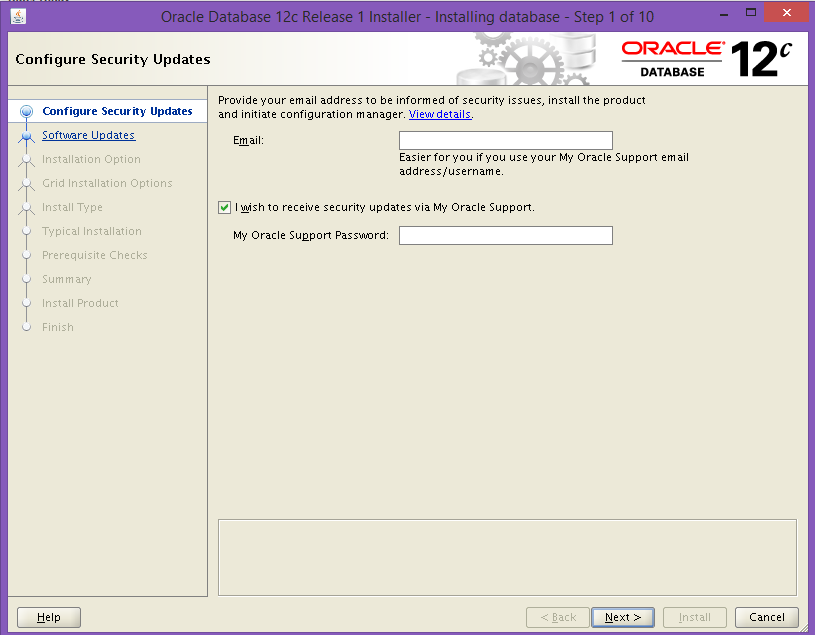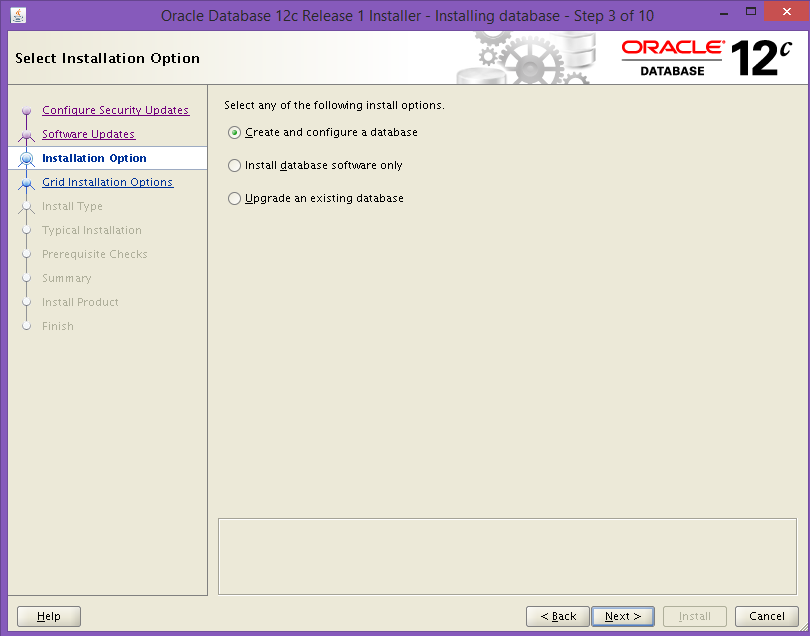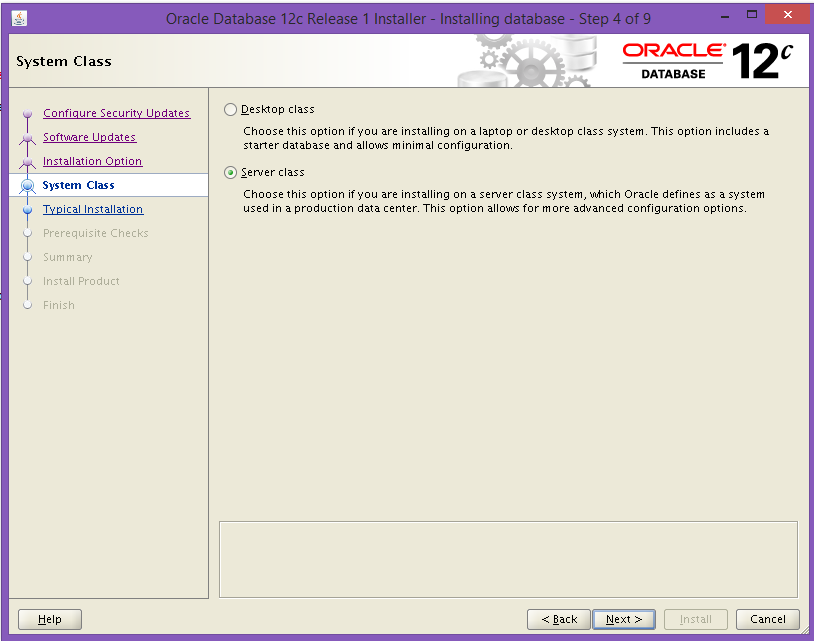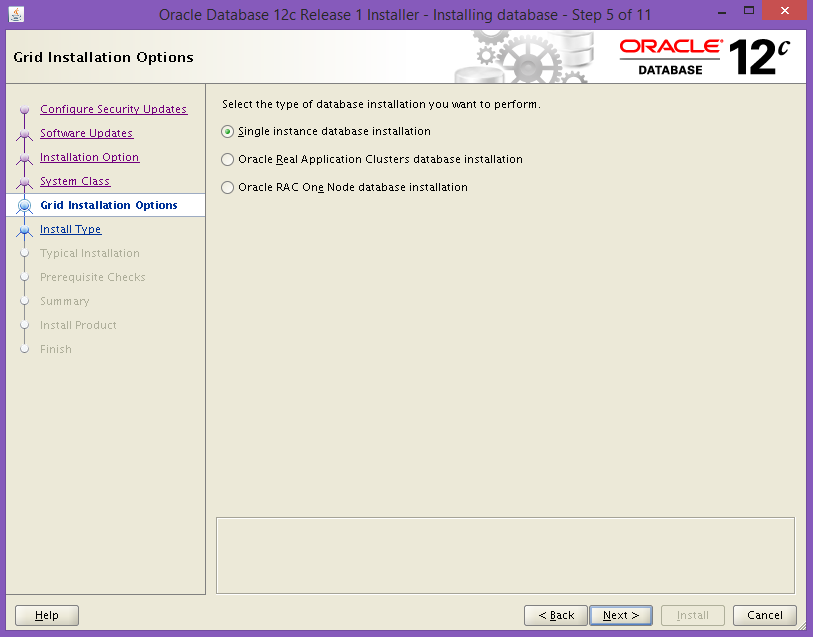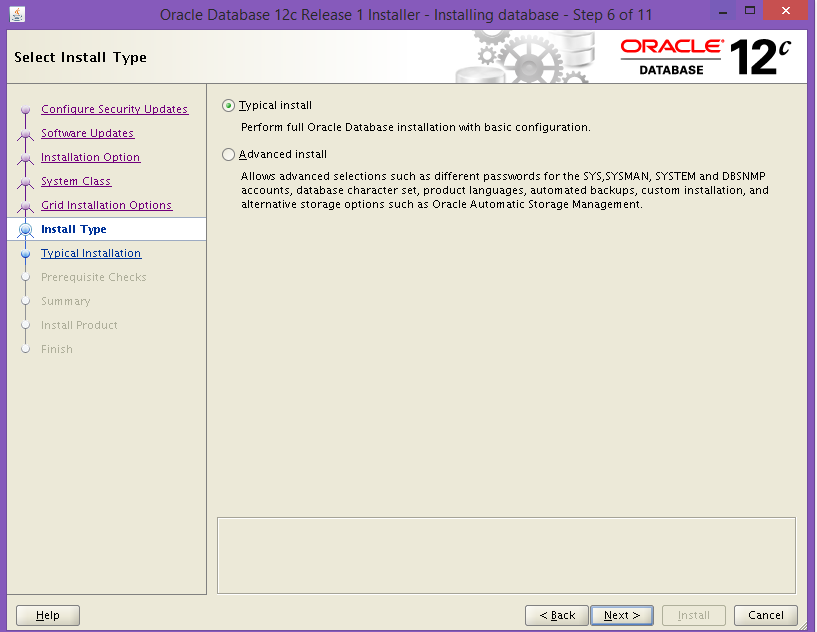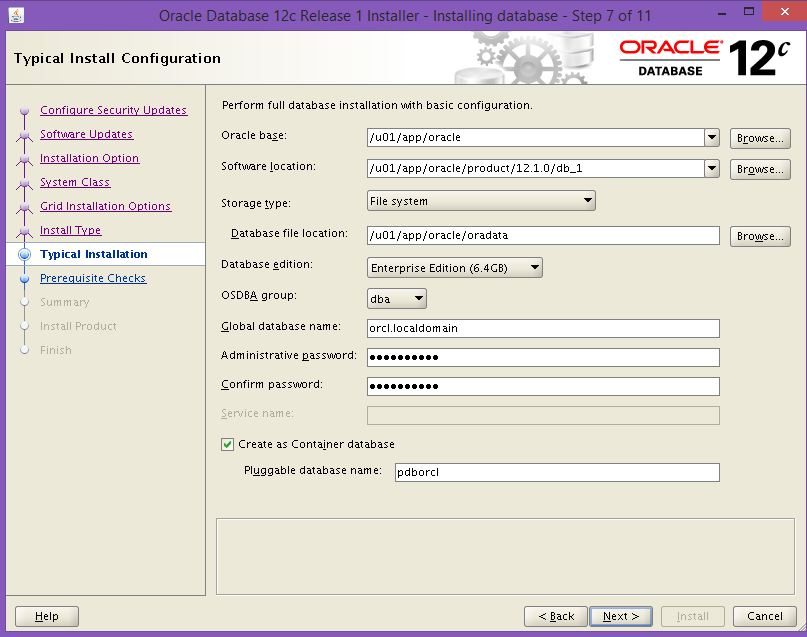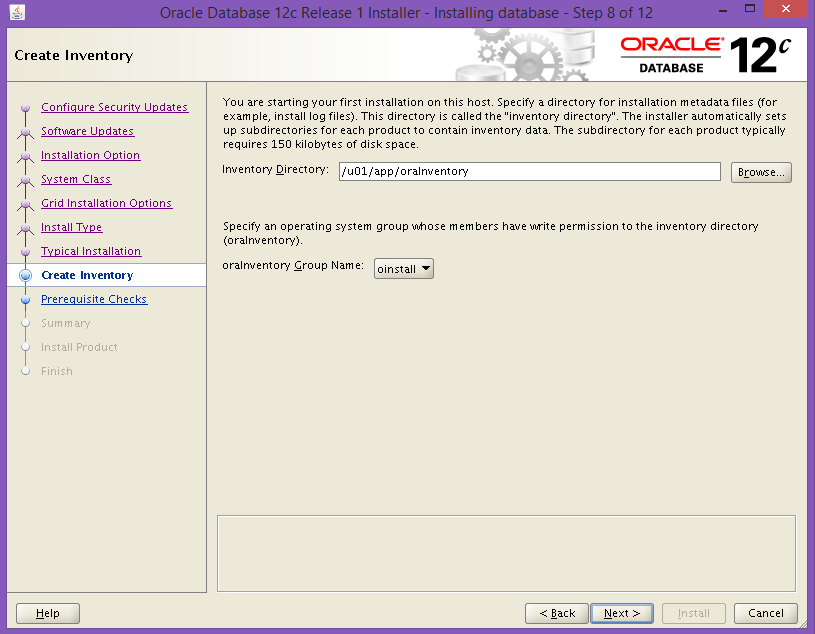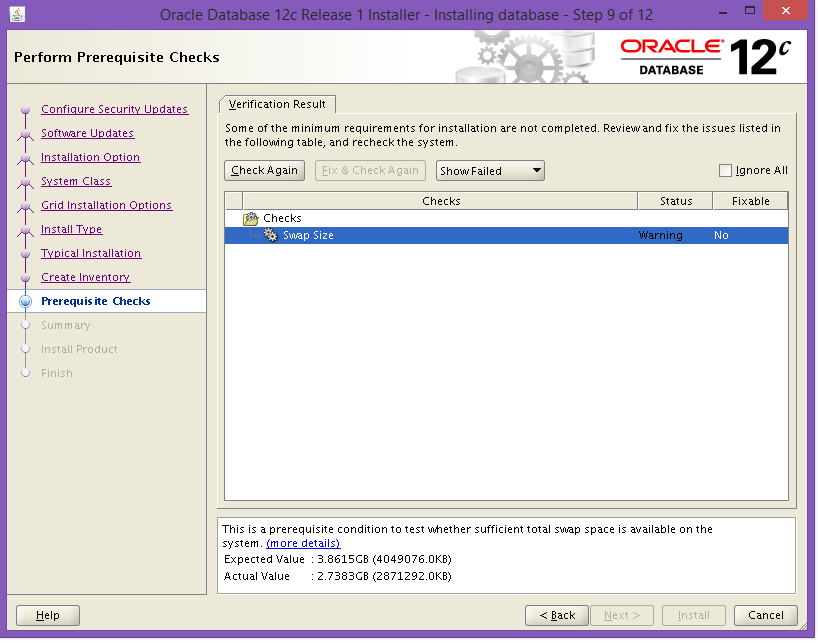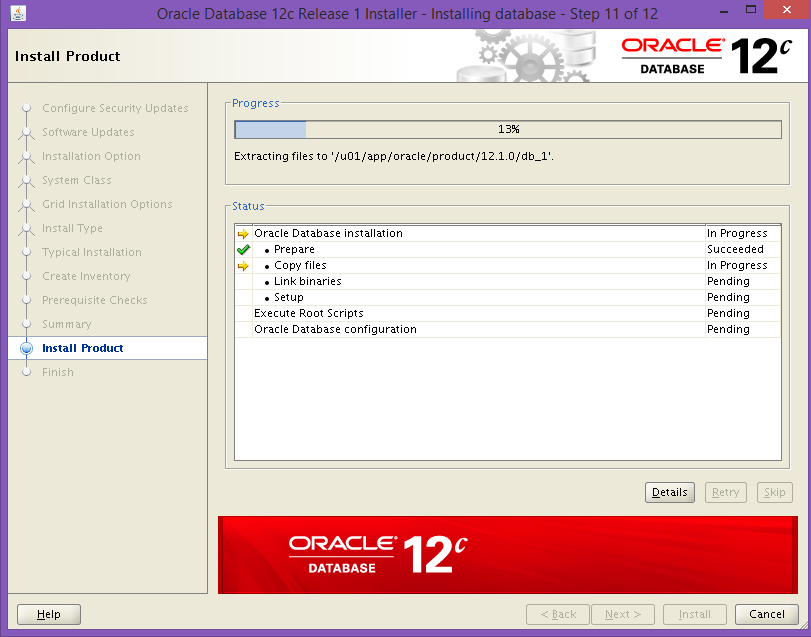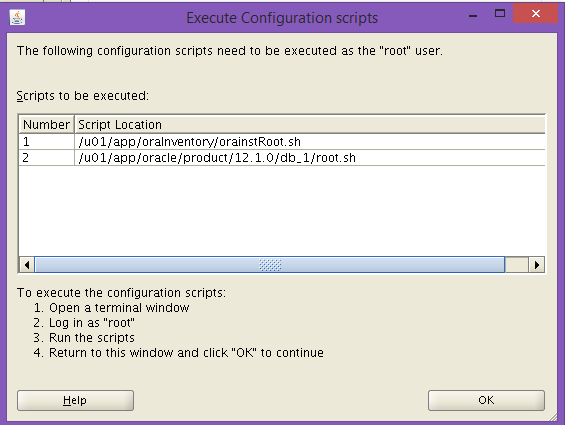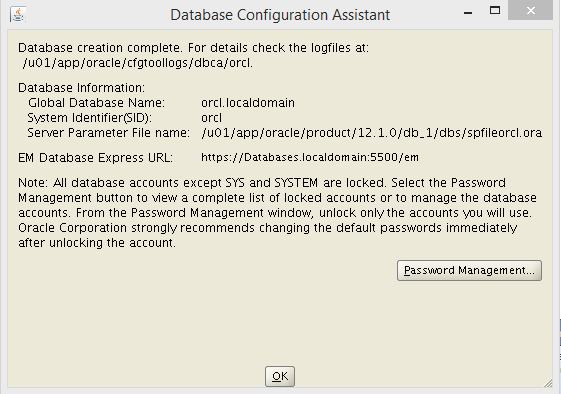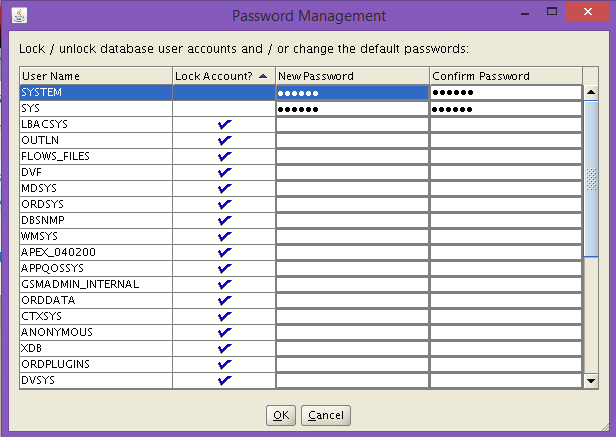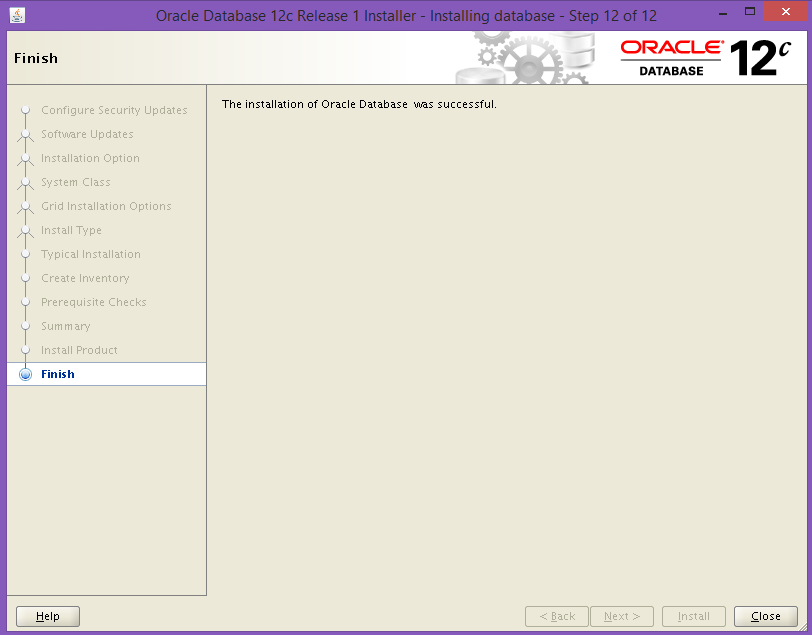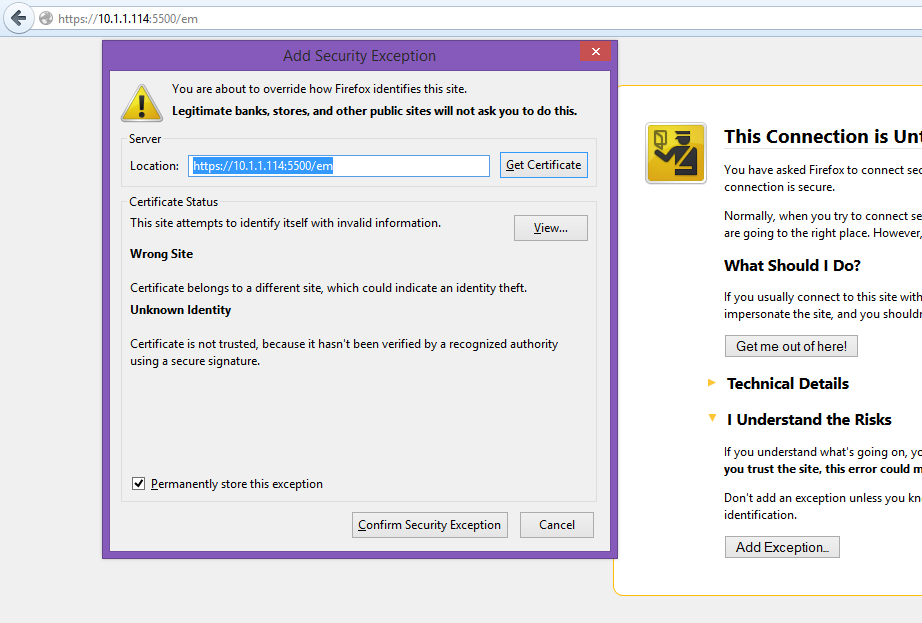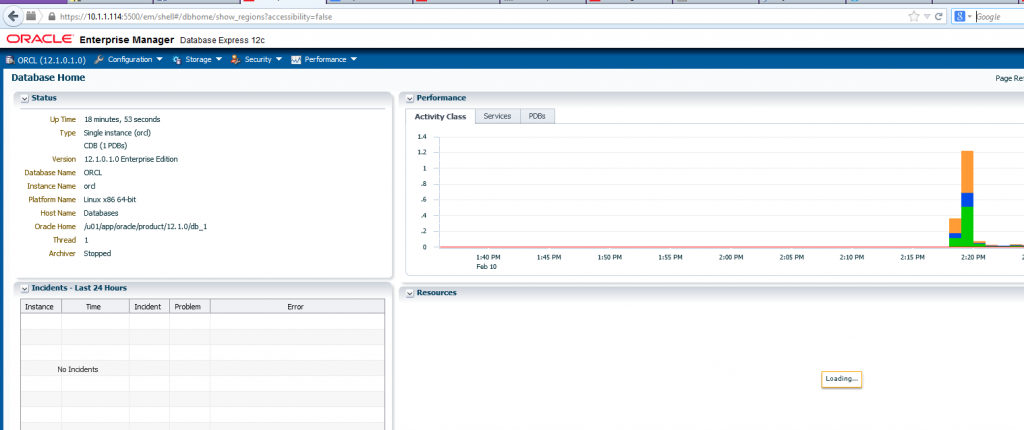In this tutorial, I’d like to show you step by step latest Oracle installation in Oracle Linux 6.5 64bit. Normally Virtualbox is not that good to install a production Oracle database environments, but it can be enough for Developers and testers.
I suggest you to use minimum of 40GB VM hard disk, 4GB SWAP and 6GB RAM.
Download Oracle database files from Oracle
Please note: Using database express server package is free and no license is required.
I downloaded the following database packages.
linuxamd64_12c_database_1of2.zip linuxamd64_12c_database_2of2.zip
After downloading, unzip the files to a folder.
Change the hostname like this:
[root@Databases Databases]# cat /etc/hosts
127.0.0.1 localhost localhost.localdomain localhost4 localhost4.localdomain4
::1 localhost localhost.localdomain localhost6 localhost6.localdomain6
10.1.1.114 Databases.localdomain Databases
Oracle Installation Prerequisites
Add oracle repository to your system:
# cd /etc/yum.repos.d # wget https://public-yum.oracle.com/public-yum-ol6.repo
Then,
# yum install oracle-rdbms-server-12cR1-preinstall-1.0-11.el6.x86_64
All necessary prerequisites will be installed automatically.
Run yum update again:
# yum update
Manual Setup
If you have not used the oracle-rdbms-server-12cR1-preinstall-1.0-11.el6.x86_64 package to perform all prerequisites, you have to manually perform the following setup tasks.
Oracle recommend the following minimum parameter settings.
“/etc/sysctl.conf” file.
[root@Databases Databases]# /sbin/sysctl -p net.ipv4.ip_forward = 0 net.ipv4.conf.default.rp_filter = 1 net.ipv4.conf.default.accept_source_route = 0 kernel.sysrq = 0 kernel.core_uses_pid = 1 net.ipv4.tcp_syncookies = 1 error: "net.bridge.bridge-nf-call-ip6tables" is an unknown key error: "net.bridge.bridge-nf-call-iptables" is an unknown key error: "net.bridge.bridge-nf-call-arptables" is an unknown key kernel.msgmnb = 65536 kernel.msgmax = 65536 kernel.shmall = 4294967296 fs.file-max = 6815744 kernel.sem = 250 32000 100 128 kernel.shmmni = 4096 kernel.shmmax = 4398046511104 net.core.rmem_default = 262144 net.core.rmem_max = 4194304 net.core.wmem_default = 262144 net.core.wmem_max = 1048576 fs.aio-max-nr = 1048576 net.ipv4.ip_local_port_range = 9000 65500
Add the following lines to the “/etc/security/limits.conf” file.
oracle soft nproc 2047 oracle hard nproc 16384 oracle soft nofile 4096 oracle hard nofile 65536 oracle soft stack 10240
Install the following packages if they are not already present.
yum install binutils-2*x86_64* yum install glibc-2*x86_64* nss-softokn-freebl-3*x86_64* yum install glibc-2*i686* nss-softokn-freebl-3*i686* yum install compat-libstdc++-33*x86_64* yum install glibc-common-2*x86_64* yum install glibc-devel-2*x86_64* yum install glibc-devel-2*i686* yum install glibc-headers-2*x86_64* yum install elfutils-libelf-0*x86_64* yum install elfutils-libelf-devel-0*x86_64* yum install gcc-4*x86_64* yum install gcc-c++-4*x86_64* yum install ksh-*x86_64* yum install libaio-0*x86_64* yum install libaio-devel-0*x86_64* yum install libaio-0*i686* yum install libaio-devel-0*i686* yum install libgcc-4*x86_64* yum install libgcc-4*i686* yum install libstdc++-4*x86_64* yum install libstdc++-4*i686* yum install libstdc++-devel-4*x86_64* yum install make-3.81*x86_64* yum install numactl-devel-2*x86_64* yum install sysstat-9*x86_64* yum install compat-libstdc++-33*i686* yum install compat-libcap*
Create the new groups and users.
groupadd -g 501 oinstall groupadd -g 502 dba groupadd -g 503 oper groupadd -g 504 asmadmin groupadd -g 506 asmdba groupadd -g 505 asmoper
useradd -u 502 -g oinstall -G dba,asmdba,oper oracle passwd oracle
Note: We are not going to use the “asm” groups, since this installation will not use ASM.
Amend the “/etc/security/limits.d/90-nproc.conf” file as described below.
# Change this * soft nproc 1024
# To this * - nproc 16384
Set secure Linux to permissive by editing the “/etc/selinux/config” file, making sure the SELINUX flag is set as follows.
SELINUX=permissive
Once the change is complete, restart the server.
If you have the Linux firewall enabled, you will need to disable:
/etc/init.d/iptables stop
Or Configure Iptables to allow the databases ports.
Create this file and change the ownership (the installation will use this later).
touch /etc/oratab chown -R oracle:oinstall /etc/oratab
Create the directories in which the Oracle software will be installed.
mkdir -p /u01/app/oracle/product/11.2.0/db_1 chown -R oracle:oinstall /u01 chmod -R 775 /u01
Login from terminal and make X11 enabled:
Edit the “.bash_profile” file of the oracle user.
# Oracle Settings TMP=/tmp; export TMP TMPDIR=$TMP; export TMPDIR ORACLE_HOSTNAME=Databases.localdomain; export ORACLE_HOSTNAME ORACLE_UNQNAME=DB12C; export ORACLE_UNQNAME ORACLE_BASE=/u01/app/oracle; export ORACLE_BASE ORACLE_HOME=$ORACLE_BASE/product/12.1.0/db_1; export ORACLE_HOME ORACLE_SID=DB11C; export ORACLE_SID PATH=/usr/sbin:$PATH; export PATH PATH=$ORACLE_HOME/bin:$PATH; export PATH LD_LIBRARY_PATH=$ORACLE_HOME/lib:/lib:/usr/lib; export LD_LIBRARY_PATH CLASSPATH=$ORACLE_HOME/jlib:$ORACLE_HOME/rdbms/jlib; export CLASSPATH
Installation
Log into the oracle user. If you are using X emulation then set the DISPLAY environmental variable.
DISPLAY=<machine-name>:0.0; export DISPLAY
Go to the extracted Zip file and start the installation under oracle user.
[oracle@Databases database]$ ./runInstaller Starting Oracle Universal Installer... Checking Temp space: must be greater than 500 MB. Actual 12551 MB Passed Checking swap space: must be greater than 150 MB. Actual 2803 MB Passed Checking monitor: must be configured to display at least 256 colors. Actual 16777216 Passed Preparing to launch Oracle Universal Installer from /tmp/OraInstall2014-02-10_01-33-40PM. Please wait .
[root@Databases Databases]# /u01/app/oraInventory/orainstRoot.sh Changing permissions of /u01/app/oraInventory. Adding read,write permissions for group. Removing read,write,execute permissions for world. Changing groupname of /u01/app/oraInventory to oinstall. The execution of the script is complete. [root@Databases Databases]#
[root@Databases Databases]# /u01/app/oracle/product/12.1.0/db_1/root.sh Performing root user operation for Oracle 12c The following environment variables are set as: ORACLE_OWNER= oracle ORACLE_HOME= /u01/app/oracle/product/12.1.0/db_1 Enter the full pathname of the local bin directory: [/usr/local/bin]: Copying dbhome to /usr/local/bin ... Copying oraenv to /usr/local/bin ... Copying coraenv to /usr/local/bin ... Creating /etc/oratab file... Entries will be added to the /etc/oratab file as needed by Database Configuration Assistant when a database is created Finished running generic part of root script. Now product-specific root actions will be performed.
Via password management, make a password for SYS and SYSTEM users:
Test your oracle Server (Listeneing ports 1521/ managment http port 5500):
[root@Databases ~]# netstat -an | grep "::" | grep tcp tcp 0 0 ::1:6010 :::* LISTEN tcp 0 0 :::5500 :::* LISTEN tcp 0 0 :::54570 :::* LISTEN tcp 0 0 :::111 :::* LISTEN tcp 0 0 :::1521 :::* LISTEN tcp 0 0 :::22 :::* LISTEN tcp 0 0 :::42230 :::* LISTEN tcp 0 0 ::1:631 :::* LISTEN tcp 0 0 ::1:25 :::* LISTEN tcp 0 0 ::ffff:10.1.1.114:1521 ::ffff:10.1.1.114:32248 ESTABLISHED
Point your browser with IP address https://ip:5500/em
Note: Iptables should be configured or disabled.
Login with sys or System as DBA to configure and add users and databases.
Enjoy!



